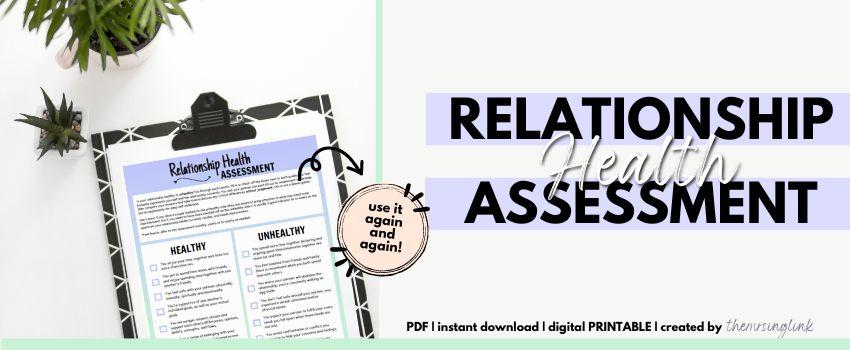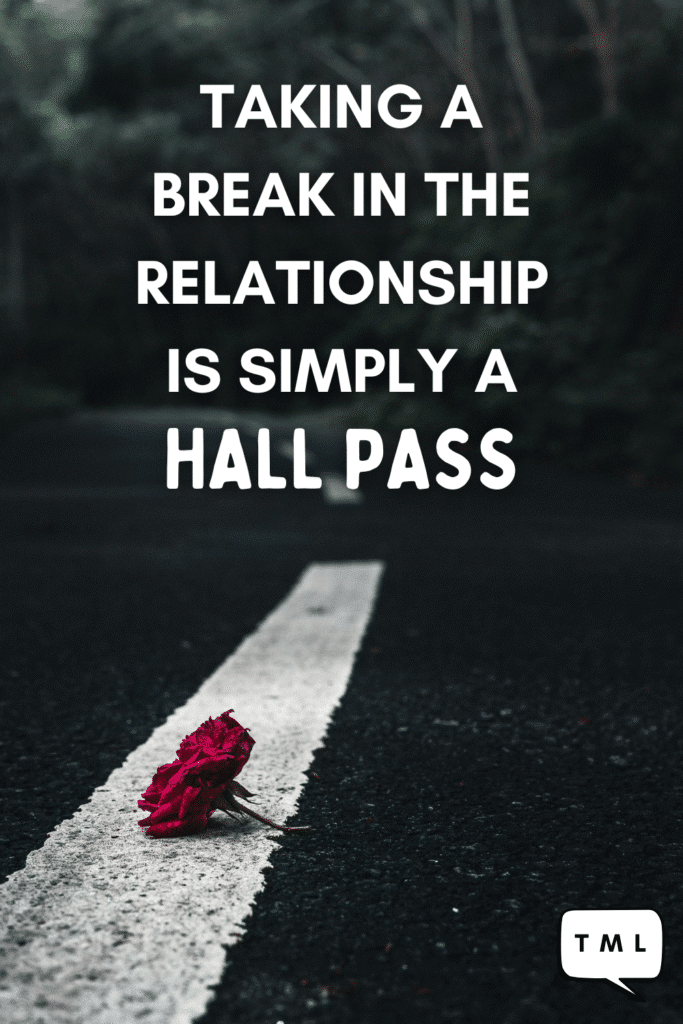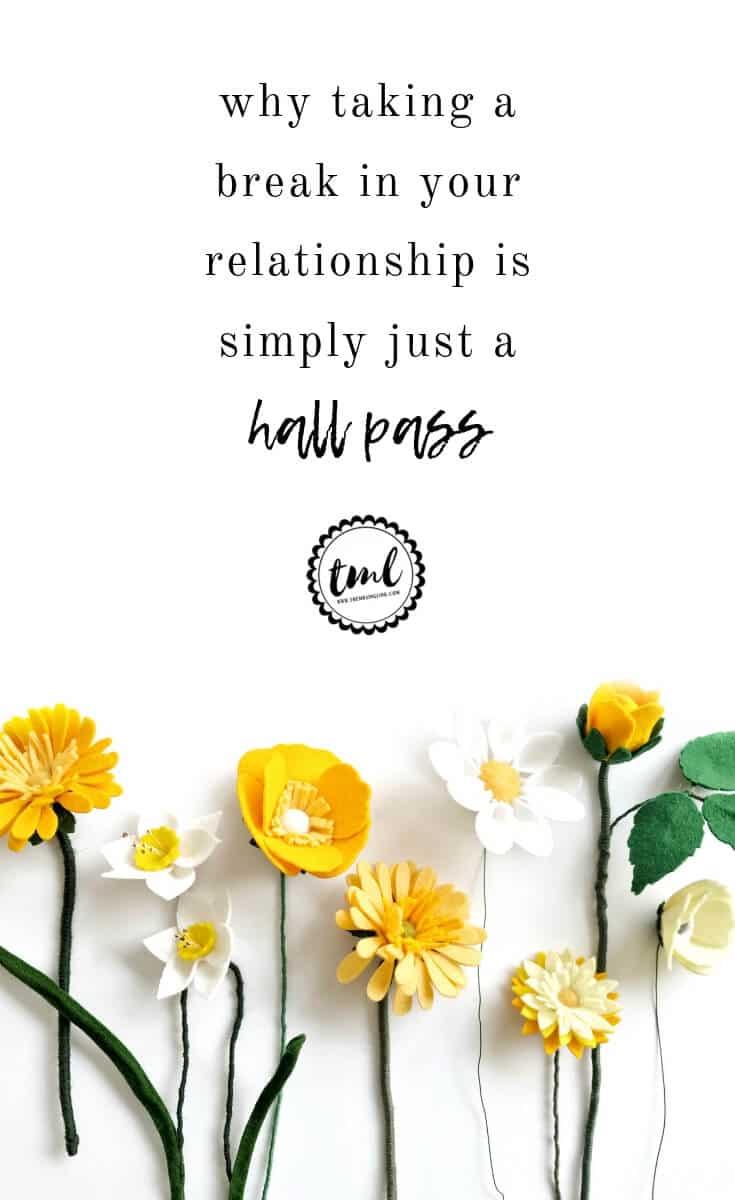Since break is half of the word “breakup“, the term is essentially a breaking point. Though most consider a break to be a pause or even a last-ditch effort. Either way, we’ve distorted what relationship breaks mean, while many are treating them like a hall pass.
Taking a break in a relationship may be referred to as the “cool down” period from a nasty argument or recurring problem within the relationship, but what is implied when one partner says to the other, “I think we need to take a break, and then see how things go“? I see nothing other than the stepping down or resigning from that commitment, even *if* the intent is to get back together.
Though I don’t personally believe in taking objective “breaks” (i.e., together but also not), I do make my best attempt to understand the reasoning behind it, and I find that it boils down to personal growth.
Individuals can’t seem to grasp the ability of serving both at the same time, while remaining “in the relationship” and fully committed rather than requiring a temporary break from the responsibilities of commitment.
The truth is taking a break in a relationship isn’t always treated with the best intentions.
They can also be an indicator of indecisiveness, a way to manipulate the relationship or to see if there are bigger, better fish in other ponds without completely letting go of the one you have, if you know what I mean.
[Clears throat] That means he’s deciding whether you and the relationship are worth the fuss, keeping you on a short leash while also seeing if there’s another enticing possibility out there.

I believe the logic behind these breaks, in the first place, is to create a temporary boundary of separation in the relationship – kind of like a relational “time out”. One that will hopefully bring each other clarity, reason, understanding and the willingness to change under the guise of *what it would be like* to not be together.
More the reason to label relationship breaks as a test – it tests commitment, trust, loyalty, each partner’s *passion* or desire for one another and whether they actually value the relationship. The downfall? These breaks can occur often and go on for days, weeks or months.
There will be times of struggle in every relationship, but struggles should never complicate your decision to stay or leave. If you’re on a break with someone, it’s likely due to unhappiness, discontentment, and disappointment (hurt, betrayal). If you’re not happy in the relationship, it’s because something isn’t working and there’s a need for change. When something isn’t working and there’s no change, you have two choices – to continue to endure or walk away.
The way I see it, taking a break is nothing short of pressing the pause button on the remote while aiming to keep certain expectations intact – aka relationship fallback, where you can simply pick up where you left off. It’s giving, “I want to be with you, but I don’t want to be together *right now*.“
Sure, we’ve used soul searching as justification for taking a break in relationship, but I still wonder why individuals think it’s beneficial (and, in fact, freeing and loving) to keep a relationship (a person) on the backburner. *This is not the same as legitimately breaking up, letting one another go about their individual lives, and to save the possibility for relationship reconciliation in the future.
Plus, in my case – as a married woman – there’s no pause button when you vow to conjoin your life with another as one. If my husband and I implemented this strategy into our marriage, we would inevitably grow apart instead of growing together. A huge, HUGE reason many married couples experience periods of falling out.
The same still applies to single, unmarried couples.
That isn’t how commitment works. Love is supposed to be freeing, yes, but commitment is to make it work together, not separately. Therefore, thinking you’ll fix your issues by calling it a “break” in your relationship won’t actually solve your problems – they will only lead to new and recurring ones.
Unpopular opinion: taking a break in a relationship is just a hall pass

A break’s intent is self-focused
Right? So that usually means no contact – it’s a literal separation. But that becomes an issue in itself when those think a *pretend* halt on the relationship will subsequently stop or eliminate said issue, or bring clarity to any confusion about whether or not you’re meant to be together.
Little do people know, even if it’s written in stone, they’re not actually focusing on parts of the self that is intended to promote growth or heal the relationship. In fact, I believe individuals are usually too busy focused on what the other person is or isn’t doing in that time.
Are we really using a break for what is said to be intended, such as reflecting on our role in the relationship and establishing healthy habits, or are we just checking our watch and waiting for our partner to change?
It’s a way to test the relationship and the waters
As I said above, relationship breaks are essentially a breaking point – maybe even hitting rock bottom. If you were to think visually, your toes are curling over the edge of a cliff. Your heel still firmly on the ground is for security and balance. Hence why many establish a break using the alleged social construct of the exclusive title with the intent of re-commitment or getting *back* together, but direction is pointed opposite to that. Meaning, the relationship is not the forefront, but somewhat a distance off or kept at arm’s length.
Unfortunately, a break is rarely just a physical separation.
A break shares very similar qualities to a breakup. On that note, going on a break can create this power struggle and imbalance of trust in the relationship. Sure, you may eventually reunite a month later, but is it always the fresh start approach? Or was a break treated like a mini vacation from the responsibilities and obligations of commitment?
For some this can create new apprehension. After all, for those who condone going on a break, it usually says a lot about their definition of commitment, their genuine ability to commit and maintain a healthy, long-term relationship.
I feel like when it’s one person who proposes a break, it’s simply a way of testing the relationship and the waters outside its borders. By “testing the relationship” and “testing the waters”, I mean testing your partner as well as seeing if the grass is greener on the other side.
That being said, I believe breaks are just an easy excuse to re-experience singlism through a glass window without completely upending the relationship.

A break isn’t with the best intentions
I stand on that I think taking relationship breaks is so high school. I also believe a break isn’t with the best intentions, mainly because a break goes against the whole freeing Love I mentioned above.
If there are legitimate problems in the relationship you can’t afford staying together to resolve, having your partner’s best interest at heart would be to simply let them go entirely, not tie them off on a leash.
It’s a way to avoid the insecurity of a breakup
I was never the type to do breaks. If we couldn’t figure out our root issues, find common ground, compromise, take accountability for our part, and make the changes we needed to…then it was only going to be a resurfacing issue ongoing.
I also wasn’t the kind of girl who broke up with a guy, got back together, only to break it off again (and, at some point, for good).
If I ever felt I needed a break, it was because I was exhausted of the relationship and the vicious cycle of problems in it. And if I was tired of the relationship, it meant I was less or no longer emotionally invested.
Therefore, in my last long-term relationship prior to my husband, I had woken up to the fact I was simply staying in that relationship just to be in one.
It never took me needing a break to decide whether I truly wanted to be with someone, nor did I ever consider it as a way to avoid the heartache of a breakup. A break mimics the very same thing, just prettier, softer and looser.
So for the couples who frequently take breaks, at some point you have to acknowledge that it might be a security in false hope, the fear of completely letting go and accepting the reality of an irrepairable situation.
